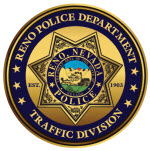
Once you have done all of the above, police are not needed to respond and you are free to leave the scene. Within 24 hours of the crash, contact your insurance company.
If someone was injured in the crash, or if it turns out that there is over $750 damage to any one vehicle, you must submit a crash report to the Nevada Department of Motor Vehicles or to the police department. In order to report the crash through the Reno Police Department’s on-line reporting system, click the On-Line Traffic Crash Report link below. You can also obtain forms from the police officer at the scene, at any DMV office, or at a police station or substation. Click the DMV Crash Report Form Link below to bring up the PDF form to download and complete for the State of Nevada DMV.
If you have been the victim of a hit-and-run crash, try to remember and quickly write down the make, model and color of the other vehicle, anything about the other vehicle's license plate, any characteristic of the other driver (sex, race, age, hair color, clothing, etc.), and any other details about the crash

The Traffic Division is committed to enhancing traffic safety for our community through education, enforcement and engineering.
Traffic Division Personnel and AssignmentsThe Reno Police Department's Traffic Division is comprised of 28 sworn officers which consists of: Lieutenant Stallcop, Sergeants Bradley and Blount along with 13 motorcycle officers, 6 crash investigators, 4 DUI officers, and 2 Detectives.
Off-Road VehiclesView a map of the designated City of Reno portal locations.
NEVADA'S RULES OF THE ROAD - BRIEFLY:
Any motorized vehicle which does not have the normal safety equipment such as lights and mirrors or is not built to federal vehicle standards is an off-highway vehicle and is restricted to off-highway use only. This includes all-terrain vehicles, pocket bikes, motorized scooters and snowmobiles.
If a vehicle was manufactured and designated for "off-road" or "non-road" use only, it may not be driven on Nevada public streets or highways even if it has safety equipment. The designation for off-highway use is usually indicated in ownership documents, the owner’s manual or by a U.S. DOT label attached to the frame of the vehicle. Only two-wheeled motorcycles may be converted to on-road use. Other OHVs may not be converted.
There are no driver license or minimum age requirements for OHVs operated off-highway in Nevada. City and county governments may designate small portions of public streets for access to or from off-road areas only and some age restrictions or other requirements may apply. See NRS Chapter 490 and NAC Chapter 490.
Division ServicesAs part of the Support Services Division, under the direction of the traffic lieutenant, the traffic sergeants supervise traffic crash investigations, enforcement activities, grant operations and service requests from the public. The thirteen officers assigned as motorcycle officers are responsible for enforcing traffic laws, identifying high crash locations within the City of Reno, and working proactively to reduce crashes and traffic fatalities. These officers must pass an intensive 80-hour motorcycle training course, as well as a 240-hour Field Training Program. Additionally, motor officers are an important part of the City's special events, due to their maneuverability in heavily congested areas and traffic control experience. Many of our traffic officers have collateral duties including firearms instruction, defensive tactics instruction, and SWAT. Motorcycle officers and crash investigators are assigned to work both day and swing shifts covering the hours of 6:00 AM - 11:00 PM.
Six crash investigators are assigned to investigate property, injury, and fatal traffic crashes, including hit-and-run crashes. They drive vehicles equipped with specialty equipment for the investigation of crashes.
Within the division is a specialized Major Crash Investigation Team (MCIT) which is responsible for investigating all crashes involving a fatality and/or a major injury. Investigators assigned to this team receive training in basic and advanced crash investigation, crash reconstruction, and interview and interrogation techniques.
The Traffic Division’s two detectives are assigned to investigate traffic crash reports submitted by the public, including hit and run crashes. They also conduct investigative follow-up from cases taken by officers in the field and are members of MCIT.
Four DUI officers are assigned to patrol the City and enforce drunk-driving laws, primarily through enforcement. Although they work late evening to early morning shifts, they occasionally adjust their schedules as the need arises. DUI officers drive vehicles specifically equipped to assist in the detection and apprehension of those driving under the influence.
Traffic-Related Citizen Service Requests, Concerns or ComplaintsHave you noticed that vehicles traveling through your neighborhood routinely exceed established speed limits? The City of Reno welcomes calls from citizens that pinpoint areas where posted speed limits are continually violated.
The City also welcomes calls concerning abandoned vehicles parked on a public street. A vehicle is considered to be abandoned if it has been parked in the same spot on the street for over 48 hours. When you call regarding an abandoned vehicle, have available the location of the vehicle, a vehicle description, and the vehicle license plate number, if there is a plate on the vehicle. For these traffic-related complaints, call RENO DIRECT at 775-334-4636 (INFO).
Traffic StopsClick below to download and print out brochures in either English or Spanish to assist you if you are stopped for any reason by a Law Enforcement Officer.
Traffic Stops: What To Do If You're Stopped By a Law Enforcement Officer
Paradas de Trafico: Que Hacer Si Usted Esta Parado Por un Oficial de la Ley